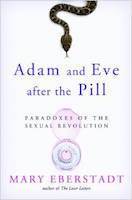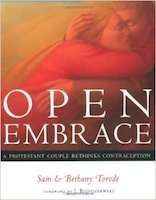Jennifer Flanders's Blog, page 26
July 11, 2015
Helping Siblings become Friends

One of the first things people usually notice about our children is how well they get along. Sure, they have occasional squabbles, but that is the exception rather than the rule. For the most part, they really love and admire one another and enjoy being in each other’s company.
They are friends.
When people ask us how this came to be the case, we’re always quick to credit God’s grace. It’s a heartfelt answer, but not particularly helpful. So for parents who are searching for ways to encourage a deep and lasting friendship between their children, we offer eight practical suggestions:
Turn off the TV
Have you ever noticed how poorly family members treat one another on sitcoms? Yet every snide remark is rewarded with liberal doses of canned laughter. If our children are raised on a steady diet of such fare, it shouldn’t surprise us when they emulate what they’ve been watching.
Even if the programing is good and wholesome, allowing children to watch too much of it precludes more meaningful, real-life interaction with their own family members. So switch off the set and make your own fun, instead.
Play Games Together
When you enter into your children’s world through play, you send them the message you enjoy being with them, and those warm feelings get sent back to you and shared with one another.
A few of our family favorites? Puzzles. Zombie tag. Spoons. Knock-Out. Chess. Checkers. Tea parties. Hearts. The Hat Game. Ultimate Frisbee. Putt-Putt Golf. Ping-Pong. Cabo. Bananagrams.
Allow for Kid-Directed Adventures
Sometimes our kids dream up things to do together that don’t include Mom and Dad: Build blanket forts. Ride bikes around the block or to the gas station for a treat. See how deep a hole they can dig in our backyard. Hike through the bamboo forest. Build bicycle ramps. Bake peanut-butter cookies. Sell lemonade on the street corner. Drive to Dallas to see Nana.
As long as the things our kids are asking to do are feasible and reasonably safe, we try to say yes to their requests. Not only do these sort of adventures build character, maturity, and confidence, but they bond siblings together in a special way that parent-directed activities alone cannot do… ( Read the rest of this post on our family blog.)








July 3, 2015
A Prayer for the Sick
A friend of mine recently asked me to pray for her nephew, who is presently fighting a recurrence of a malignant brain cancer known as medulloblastoma.
His name is Gabe — if you’d like to send up a prayer for him, too, I know they’d be grateful — and he graduated from high school the day before this latest tumor was discovered.
[click on image to print B&W copy]
I’ve been thinking about Gabe a lot lately. It makes my mother-heart hurt to even imagine what their family is going through.
Sometimes, when problems loom large, it’s hard to know where to even begin in your prayers, but in this instance, God brought the following Scriptures to mind almost immediately. These are the verses I’ve been praying over Gabe:
P is for Peace
Pray that God would calm their heart, quiet their fears, and grant them a peace that passes understanding. Ask Him to carry them through this trial and comfort them with His presence. Pray that they’d find complete rest in Him, casting their burdens at the foot of the cross and leaving them there. (Psalm 56:3, Philippians 4:7, Matthew 11:28, 2 Corinthians 1:3-4 Exodus 33:14, Psalm 68:19-20)
R is for Relationships
Pray that God would use this illness first and foremost to draw others unto Himself. Pray that relationships to family and friends would also be strengthened, that any past offenses would be freely forgiven, and that sincere words of love and affirmation would be spoken. (John 6:44, Exodus 20:12, 1 John 4:20, Proverbs 17:17, John 15:12, Ephesians 4:15)
A is for Assurance
Ask God to assure them of His great love and faithfulness. Pray that He would remind them that He has a purpose and a plan, that He is in control, that He can work all things together for their good and His glory, and that He is committed to continuing His work in their hearts until it is completed. (Psalm 117:2, Jeremiah 29:11, Psalm 103:19, Romans 8:28, Philippians 1:6)
Y is for Yielding
Pray that the afflicted would yield themselves completely to God and place their full trust in His son, Jesus Christ. Pray that the would boldly approach the throne of grace to make their requests known unto God, yet would still be able to say with all sincerity, “Not my will, but Yours be done.” (Joshua 24:23, Proverbs 3:5-6, Romans 10:9, Hebrews 4:16, Philippians 4:6, Luke 22:42)
E is for Endurance
Ask God to strengthen and uphold them in the days ahead. Pray for their physical, mental, emotional, and spiritual fortitude. Pray that God would give them grace as they walk through this trial and protect them against weariness and despair. Ask Him to bear their burdens and put a song of deep and abiding joy in their heart. (Isaiah 41:10, James 1:2-3, James 4:6, Isaiah 40:31, 2 Corinthians 4:8, Psalm 55:22, Isaiah 49:13)
R is for Restored Health
Pray that the Lord would mercifully and miraculously restore the one who is sick to health. Pray that He would heal them, body and soul, and would receive all the glory for having done so. Ask Him to prolong their life, and pray that they’d live out the remainder of their days in grateful service to Him. ( James 5:15-16, Matthew 8:17, Luke 4:40, 1 Timothy 1:7, Psalm 91:15-16, 1 Samuel 12:24)
Do you have friends or family members who are struggling with poor health? Pray for them! Scripture tells us:
“…the prayer offered in faith will restore the one who is sick, and the Lord will raise him up, and if he has committed sins, they will be forgiven him. Therefore, confess your sins to one another, and pray for one another so that you may be healed. The effective prayer of a righteous man can accomplish much.” – James 5:15-16
To download a free printable copy of this prayer guide, click here. To view copies of our other prayer guides, follow this link.








June 21, 2015
Fathers Matter (Every Day of the Year)
 Last Sunday was Father’s Day — a day for celebrating the parent that goes largely unnoticed and under-appreciated the rest of the year.
Last Sunday was Father’s Day — a day for celebrating the parent that goes largely unnoticed and under-appreciated the rest of the year.
Dads are under-appreciated partly because our society is no longer conditioned to hold fathers in high esteem.
Fathers have long been a favorite target of television sitcoms, where the vast majority of them are depicted as inept, irrelevant idiots more deserving of ridicule than respect.
For decades, fathers have been marginalized and emasculated and treated as if they have nothing of value to contribute to their family’s life beyond its economic support (if that).
And to the degree that life imitates art, men must fight against these stereotypes, not only in contemporary culture, but sometimes even in their own homes.
But another reason dads go unnoticed and under-appreciated is because so many of them are absentee fathers — they’re seldom around to attract any attention or appreciation.
This may be due to death, divorce, abandonment, or career choice; regardless of the cause, their absence comes at a high cost to the children they’ve left behind.
Despite what the liberal media might lead us to believe, fathers play a vital, irreplaceable role in the development of their children. Despite the divorce lawyers’ assurances that “kids are resilient and will quickly adjust to life without you,” the children rarely (if ever) escape such an ordeal unscathed. Most will carry scars from their parents’ split for the rest of their lives.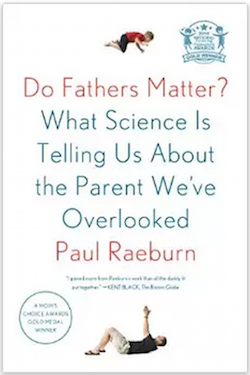
And while having a loving, engaged father living in your home, eating at your table, and taking interest in your life is not essential to success, studies show that paternal involvement makes such success a lot more probable.
According to a fascinating new book by Paul Raeburn, Do Fathers Matter?: What Science Is Telling Us About the Parent We’ve Overlooked , the general consensus, at least in the research community, is that fathers do matter. They matter a lot.
, the general consensus, at least in the research community, is that fathers do matter. They matter a lot.
Beginning before conception and moving through pregnancy, delivery, infancy, children, teens, and all the way to fathering in old age, Raeburn covers cutting-edge research that gives insight into how fathers shape their children, for better or worse.
The bottom line? When fathers are involved, everybody fares better:
The children benefit.
Infants respond most positively to the way their father plays with them, which tends to be more physical and idiosyncratic than their mother’s play. (p. 126) Furthermore, children of fathers who engaged in the most physical and enjoyable play were less aggressive, more competent, and better liked by their peers. (p. 152)
Fathers have a huge impact on their children’s language development, even more so than mothers and irrespective of the mother’s education level or how she speaks to the children. (p. 145)
Children with fathers who are supportive and encouraging show a boost in intellectual development. (p. 147)
They also do better in school, both academically and socially: Paternal encouragement is associated with better relationships between children and their school teachers, as well as better behavior and social skills. (p. 150)
Engaged, attentive fathering has been linked to higher IQs in children, lower risk of smoking as teens, and even lower incidence of depression and psychological ailments decades later. (p. 151)
Sadly, there appears to be a robust association between father absence — both physical and psychological — and accelerated reproductive development in daughters, increased sexual risk taking, and higher incidence of teen pregnancy and STD infection. (pp. 160-164)
The wives benefit.
When fathers are present in the delivery room, mothers are less likely to cry or to require pain medication. (p.111)
Supportive parenting on the part of fathers has been shown to improve the behavior of mothers toward their children. When he’s more loving and attentive, she is, too. (p. 147)
When couples forge a strong alliance in parenting, their marriage is strengthened, as well. (p. 85)
The fathers themselves benefit.
Fathers who are involved with their children have a reduced incidence of illness and mortality. (p. 138)
Men who devote more time to fatherhood also have higher self-esteem and lower parental stress. (pp. 123-124)
Interestingly, low testosterone is not only associated with increased longevity, but also with better, more attentive fathering (pp. 74-75) — so why does our society push supplemental testosterone on middle-aged men as if it were candy?
And those findings are just the tip of the iceberg. I’d encourage you to read Do Fathers Matter? to get the details on the benefits mentioned above and to discover a myriad of others.
So what does all that mean for us? How should these studies affect our day-to-day lives?
For me — and these are my thoughts, not the author’s — this book serves as just one more reminder of how vitally important it is that I nurture my marriage. The next generation is counting on it!
No matter how much others would like us to believe that marriages are just contracts of convenience that can be dissolved without consequence, that simply isn’t true. When Mom and Dad go separate ways, the children are always affected.
No matter how often society argues that what consenting adults do in private should be of no concern to anybody else, their behavior does affect the community around them — especially the children.
And no matter how emphatically our culture insists that one definition of “family” is just as good as the next, the preponderance of research indicates there is an optimal design, at least when it comes to rearing offspring: that of a father and a mother firmly committed to one another and jointly and lovingly involved in the lives of their children.








June 14, 2015
Praying for Our Country
 Today is Flag Day, which commemorates the adoption of the flag of the United States by the Second Continental Congress in 1777.
Today is Flag Day, which commemorates the adoption of the flag of the United States by the Second Continental Congress in 1777.
Whether you celebrate such occasions by sending up the Stars and Stripes or not, I hope you will make it your practice to send up a prayer for our country — and not just on national holidays.
America needs prayer. She needs it now more than ever.
We all do.
But God has promised,
“If my people, who are called by my name, will humble themselves and pray and seek my face and turn from their wicked ways, then I will hear from heaven, and I will forgive their sin and will heal their land.” – 2 Chronicles 7:14
Won’t you join me in praying for our country?
Here’s my prayer. If you’d like to make it yours, as well, just scroll to the bottom of the post for a free printable copy of this guide:
Praying for Our Country
C is for Conviction of Sin
Pray that God would open our eyes to personal and corporate sin and would call us out of darkness into light. Ask Him not to abandon us to wrong thinking, but to forgive us and cleanse us and break the chains that bind us. Pray that He’d give us the strength and willpower to forsake, repent, and turn completely away from the sin that entangles and enslaves us. Pray that He’d enable us to live as servants of righteousness instead. (Acts 26:18, Romans 1:28, 1 Kings 8:50, Psalm 51:2, , Isaiah 58:6, Isaiah 55:7, 2 Corinthians 7:9-10, Hebrews 12:1, Romans 6:18)
O is for an Outpouring of God’s Spirit
Ask God to revive our hearts and draw us unto Himself. Pray that He’d fill us with His Spirit, that we might speak the Word boldly and with such authority that others would recognize we have been with Jesus. Pray that He’d empower us to walk in His presence, according to His calling, dedicating ourselves to the good works He prepared beforehand for us to do. (Psalm 80:18,John 6:44, Acts 4:31, Titus 2:15, Acts 4:13, Psalm 140:13, 2 Timothy 1:9, Ephesians 2:10)
U is for Understanding and Wisdom
Pray that God would grant us an extra measure of wisdom, that He would fill us with knowledge and understanding and discernment. That we would see things as He sees them and would stop calling that which is good “evil” and evil “good.” Pray that we would center our minds on what is true and right and noble and pure and lovely. (James 1:5, Philippians 1:9, Psalm 119:125, 2 Kings 6:17, Isaiah 5:20, Philippians 4:8)
N is for News You can Use
Ask God to raise up an army of journalists, reporters, and newscasters who are more concerned with proclaiming truth than with pushing politically-correct propaganda or propping up ratings. Pray that He’d break our country’s addiction to celebrity gossip and sensationalized accounts of current events and that we’d instead learn to use the news, not as entertainment, but as motiviation to pray and to make a difference in our world for good. (1 Corinthians 13:6, Proverbs 22:21, Galatians 1:10, Exodus 23:1-2, Proverbs 16:28, 2 Thessalonians 3:11, Colossians 4:2-3, Matthew 25:35-36)
T is for the Truth to Prevail
Pray that truth would be spoken in love, that it would be proclaimed, not only over our newswires, but in our homes, in our churches, in our schools, and in our courtrooms, as well. Pray that parents would guide their children in the truth, that pastors and teachers would rightly handle the Word of Truth, that judges and juries would uphold the truth, that the Holy Spirit would help us discern truth from error. (Ephesians 4:15, 3 John 1:4, Deuteronomy 11:19, 2 Timothy 2:15, Zechariah 8:16, John 16:13, John 8:32)
R is for Righteous Leaders
Pray for those in authority over us, that they might fulfill the purpose for which God placed them in their current position. Pray that those elected/appointed to office would be trustworthy and God-fearing, and that they would issue decrees that are just. Ask God to grant wisdom and discernment, both to the elected and to those doing the electing. (1 Timothy 2:2, Romans 13:1, Exodus 18:21, Proverbs 8:15, Daniel 2:21, Acts 1:24)
Y is for Yourself — Where Real Change Starts
Humble yourself before God and plead for mercy. Pray that whatever work He wants to do in your country would begin in your own home, in your own heart. Ask Him to enable you to recognize and address the log in your own eye, rather than focusing your attention on the speck in your brother’s. Pray that He would deliver you from evil and help you live an exemplary life in speech, conduct, love, faith and purity. (James 4:6, 2 Chronicles 34:27, Luke 6:42, Matthew 6:13, Matthew 6:6, 1 Timothy 4:2)
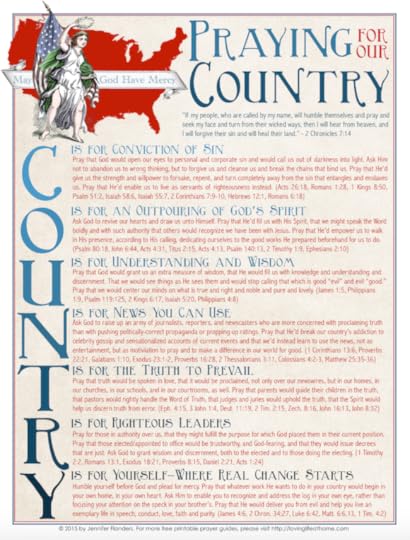
[Click on image to print B&W version or here for full-color version]
I know many of my readers are not from the US. I would encourage you to pray for your country and its leaders as well. Other than the clip art, this guide is not specific to America. :-)








June 6, 2015
7 Smart Reasons to Save Sex for Marriage
 Earlier this week, I published an essay written by my daughter concerning her commitment to save sex for marriage. Choosing to walk a path that others have long since abandoned can make for a lonely journey, and she sometimes wonders whether her carefully preserved virginity will ever be valued or appreciated by anybody else.
Earlier this week, I published an essay written by my daughter concerning her commitment to save sex for marriage. Choosing to walk a path that others have long since abandoned can make for a lonely journey, and she sometimes wonders whether her carefully preserved virginity will ever be valued or appreciated by anybody else.
I’m confident it will.
I am trusting that God — in His perfect timing — will bring my precious girl an amazing husband, one who will recognize and appreciate what a treasure she is. I know He is able to do immeasurably more than all we ask or imagine. (Ephesians 3:20; Romans 8:32; Matthew 7:11)
In the meantime, I pray for her. I affirm her good choices. And I encourage her to keep walking that lonely path, as there are lots of smart reasons to save sex for marriage:
The Bible Commands It
God designed sex to be enjoyed only in the context of marriage; He forbids it in every other circumstance. His commands are safeguards designed not to confine us, but to protect us. Not to stifle our enjoyment, but to heighten it. That should be reason enough to cooperate with His plan, but for those who need more convincing, here are six other compelling arguments for saving sex for marriage:
Limits Exposure to Disease
In the US alone, there are nearly 20 million cases of new sexually transmitted infections every year — all from just eight viruses and bacteria. One in two sexually active persons will become infected with an STD by age 25. Saving sex for marriage greatly reduces the risk of contracting STDs — and when a virgin marries a virgin, that risk is almost completely eliminated.
Prevents Out-of-Wedlock Pregnancy
Abstinence is the only 100% fail-safe method of birth control (and carries with it none of the health risks associated with hormonal contraceptives). Barring in-vitro fertilization or immaculate conception, if you don’t have sex before marriage, you won’t get pregnant before marriage. Children do best when raised by a mother and a father; saving sex for marriage increases the odds they’ll have both.
Minimizes Comparisons
If you have no sexual experience with anybody prior to marriage, you will have no frame of reference by which to judge your spouse’s performance. This goes a long way toward putting minds at ease — your husband won’t be constantly wondering how he measures up against your past lovers. The same holds true for a woman who marries a virgin husband. Instead of being anxious and self-conscious, couples who are inexperienced in the area of physical intimacy can learn and grow together, just as God intended.
Reduces Guilt and Stress
Saying “no” to sex before marriage means saying “no” to the worries that often accompany it: the fear of being found out, the worry that your partner is using you, the misgivings about where the relationship is headed, the concerns about pregnancy and disease, and the guilt for violating Scriptural injunctions. The hook-up culture is fraught with stress, so don’t sleep with someone you haven’t married — sleep with a clear conscience, instead.
Encourages Marriage
There was once a time when a major impetus for marriage — at least, for men — was the promise of sex that came with it. I don’t think we’d see so many young people waiting until they’re nearly thirty to marry, if it also meant waiting until they’re nearly thirty to do what married couples do. The fact that sex is so freely available to singles today has, for many, removed the incentive to get married ever, much less early. (Why take on the burden and responsibility of a wife and family when immediate, no-strings-attached gratification is available via hook-ups and porn?)
Saying “no” to sex outside of marriage may not change the current cultural trend toward postponing marriage (or forgoing it altogether), but it will keep you from wasting time dating guys who are only after one thing, as they won’t stick around long once they realize you’re serious about waiting. That works out, since a man with that mindset (who’d pressure a girl for sex and ditch her if he doesn’t get it) is not good marriage material, anyway.
Rewards Commitment
Virginity is a very special gift you can only give away once. Saving sex for marriage allows you to give it to a person who isn’t just saying he loves you to get what he wants, but has proven it by making a lifelong commitment. Plus, couples who save sex for marriage fare better, both in terms of marital stability and sexual satisfaction.
 But what if you’ve slipped up? What if you are unmarried, and your virginity has already been given away?
But what if you’ve slipped up? What if you are unmarried, and your virginity has already been given away?
I am speaking from experience when I say there is still hope (Ephesians 2:3-10). You do not have to let your past dictate your future.
In Christ, you can find forgiveness, grace, and strength to follow a different path going forward.
It takes intentionality and determination, but there are several things you can do that will make preserving purity easier.
And for those who are already be married but may be regretting mistakes made beforehand, I offer this word of advice: You can’t make up for being promiscuous before marriage by being frigid afterwards.
Don’t punish your husband in the present for mistakes either of you made in the past.
There’s a time for everything under heaven, but our society has it backwards: The time for saying “no” to sex is before you tie the knot.
Once you are married, the response your husband should hear most often from you in regards to sex is “yes.”
(For the rationale behind this statement, read: Why I keep Saying Yes to Sex)
Join in the conversation:
What are your thoughts on these matters?
How did your attitudes toward sex before marriage impact your relationships afterwards?
How would you encourage a young person who wants to save sex for marriage, but has grown weary with waiting?








May 30, 2015
Virginity: Is It Really Worth Saving?
 When you’re sweet-16-and-never-been-kissed, people write songs about it, but when that status hasn’t changed by your mid-twenties, people begin to look a little askance at you.
When you’re sweet-16-and-never-been-kissed, people write songs about it, but when that status hasn’t changed by your mid-twenties, people begin to look a little askance at you.
That isn’t the way it should be — isn’t the way it’s been for thousands of years — but, unfortunately, that’s the culture our children are growing up in, where virginity is regarded by many as more of a curse than a prize.
What follows is an essay written by my daughter Bethany. She is smart, sweet, beautiful, talented … and single. She is also a member of that seemingly shrinking population of young people determined to save sex for marriage. (Stay tuned for another post tomorrow on why I believe that’s still the best choice.)
Please don’t misconstrue the intent of what she has written here. As she assured her friends when she originally posted this essay on Facebook, she does NOT regret her choices, nor does she think she’d be happier had she chosen a promiscuous lifestyle:
“What I’m saying,” she writes, “is that I don’t know what ‘waiting for marriage’ is supposed to look like if marriage never comes. And I’m not just talking about sex. I’m talking about everything — so much of our identity and purpose in Christian culture is wrapped up in the idea of being a wife and mother.
“I know all about ‘Love & Respect,’ about honoring God by honoring your husband, about following him as he follows the Lord, about being a ‘help-meet.’ All of that was beautifully modeled for me.
“But seeking holiness and meaning as a single woman? Even when that singleness is indefinite? That I am having to learn vastly on my own and without an example. This essay wasn’t intended to condemn abstinence as antiquated and obsolete; it was intended to shed light on the loneliness that often accompanies choosing a path that most others have long-since abandoned.
“And hopefully, by reading this post, others who are in a similar situation will feel a little less alone.”
Mint Condition
I was raised in the age of beanie babies and purity rings. Everyone I knew bought into the hype, with sterling silver rings on their left index fingers and rows and rows of beady-eyed bears lining their shelves. The rings invariably read “True Love Waits” and the pristine, heart-shaped tags on the bears invariably read “ty.”
Labels, you see, are of the utmost importance when you are 12 years old and still discovering what in this world – what in your own self – is of any worth.
I never bought a purity ring. I often wondered if maybe I should get one – you know, so that people would know what a good girl I was. So that people would know how seriously I took my faith (or my virginity, really, since at the time the two seemed interchangeable.)
But I never got one.
Purity rings [in my mind] were for the pretty girls, the ones with the boyfriends, the ones with the opportunities.
I had never been given that sort of offer, so I had no need for a ring to remind me to reject it.
And so I managed to escape puberty with naked fingers and not-naked everything else.
I did not, however, escape the beanie baby hype.
To be fair, I didn’t buy it myself. It was a gift. Brand new with tags and in a box that had never been opened, it came accompanied by a promise and a warning:
A promise that if I left it in the box, left it unopened and un-tampered with, that one day it would be worth a fortune.
And a warning that if I took it out – even for a moment – if I risked getting it dirty or losing those precious tags, it would be utterly worthless.
All my friends had beanie babies, and those beanie babies stayed in their boxes for days, weeks, months, even years. But eventually they all came out of their clear cubic prisons. The beanie babies were played with and shared, just like toys are meant to be. Their tags came off, as had been warned, and the fortune my friends might have had was forever lost.
Oh, but not mine. I heeded those warnings and hid my beanie baby away, safe from all the perils a carefree and careless childhood might bring. And as I watched my friends laughing and sharing and playing, I reminded myself over and over again of the fortune that awaited me if I just waited.
A lifetime has passed since then, a lifetime so very different from what my 12-year-old self imagined it would be. The purity rings and stuffed animals have long since passed out of fashion, ending up in garbage bins and garage sales and goodwill piles. But she is still here: my little brown bear with her heart-shaped tag, hidden safely in her box on my shelf – in perfect mint condition.
When people see her sitting there, their reactions are varied. Some are impressed that I’ve managed to keep her for so long. Some are nostalgic for the time when they, too, believed that a little stuffed animal carried with it all the hopes and dreams and promises of a prosperous future. But more often than not, it’s viewed as strange.
To be a quarter of a century old and in possession of such a novelty is an oddity, to say the least.
But despite all that, I’ve grown sentimental. I’ve had her for so long now that I could never just throw her out or give her away to a stranger like so many others before me have done. And in all honesty, I’m beginning to think that – despite all those pretty promises I was given at 12 – she isn’t worth anything at all anymore. She’s become nothing more than an odd remnant of a lost time that no one really wants to re-visit.
And somehow, by association, so have I.
But a part of me still secretly hopes that some day a collector will show up on my doorstep – an oddity, like me, who clung to those same childhood promises that I did. I imagine him falling to his knees and joyously proclaiming that she’s the one, the rare and unique treasure he’s been searching for his entire life. Then, at long last, she could come off her shelf and be exchanged for the fortune I was promised so long ago.
I wouldn’t mind parting with her then, because I’d know that she was valued. That she’d be cared for and treated with gentleness and respect.
It’s such a silly, pretty dream. With each passing year it becomes a little less realistic, a little more ridiculous.
But the hopeless romantic in me still clings to it, just the same.
So she sits there with me to this day.
Waiting, waiting, waiting.
A symbol of the innocence and hopeful naïvety of a childhood past.
Priceless? Worthless? I suppose that distinction is in the eye of the beholder.
We are both untouched.
Unblemished.
In Mint Condition.








May 10, 2015
Why God Made Mothers
I woke up this morning with the following verses forming in my head, so in honor of Mother’s Day (and at the risk of stating the obvious) here’s why I think God gave us mothers:

Why God Made Mothers
by Jennifer Flanders
For giving birth — as moms do best,
For nursing babies at her breast,
For singing lullabies at night
For soothing fears and hugging tight,
For wiping teardrops from my eye
And sympathizing when I cry
While kissing boo-boos on my knee,
For bringing out the best in me,
For teaching me to tie a lace,
For using spit to clean my face,
For rocking me upon her lap
Cajoling me to take my nap,
For baking cookies by the batch,
For making sure the doors are latched
At night before she goes to bed,
For placing cold rags on my head
Whenever I am feeling sick
And fetching throw-up buckets, quick!
For bringing me “just one more” drink,
For understanding how I think,
For daily lifting me in prayer,
For combing tangles from my hair,
For teaching me to blow my nose,
For scrubbing stains out of my clothes,
For reading stacks of picture books,
For complimenting my good looks
And calling me endearing names,
For driving me to football games,
For watching o’er me as I play,
For spanking when I disobey,
For letting me help wash the dishes
After dinner — so delicious,
Coaxing me to eat green beans,
For being patient in my teens,
For measuring how fast I grow,
For holding on, for letting go,
For all the many things you do,
I’m grateful, Mom, God gave me you.








May 9, 2015
Postponing Motherhood… at What Cost?

Back when my husband was in medical school, his pharmacology textbook listed seven full pages of adverse side effects associated with oral contraceptive use, including:
heart attacks
strokes
liver tumors
blood clots
gall bladder disease
migraine headaches
depression
loss of vision
urinary tract infections
yeast infections
weight gain
thyroid problems
high blood sugar
… and myriad more, as well as an increased risk of infertility, miscarriage, and birth defects even after discontinuing use of the Pill.
That was enough to convince us we’d made the right decision when, as newlyweds, we opted to forgo hormonal contraceptives three years (and two babies) earlier.
Yet when we shared this information with family and friends, they remained skeptical. “If the Pill were really that unsafe,” they reasoned, “then doctors wouldn’t prescribe it.”
Fast forward 25 years, and we’re still having those same discussions. That’s why my husband recently bought me a copy of Sweetening the Pill: How We Got Hooked on Hormonal Birth Control.
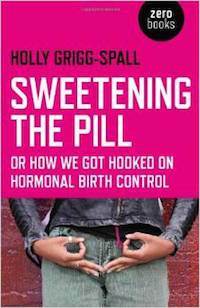 The author, Holly Grigg-Spall, writes from an ultra-liberal, pro-abortion, anti-Christian, doctor-bashing, communist-sympathizing, sexually-licentious radical feminist perspective.
The author, Holly Grigg-Spall, writes from an ultra-liberal, pro-abortion, anti-Christian, doctor-bashing, communist-sympathizing, sexually-licentious radical feminist perspective.
In other words, she is my ideological opposite.
Yet on one point we can emphatically agree: that there are compelling reasons to reject hormonal contraceptives that have nothing to do with religion.
I found the book refreshing (despite the author’s rather one-dimensional representation of folks — like me — who do not share her political agenda).
It asks questions that desperately need to be asked, discussed, and answered. Plus, it’s chock full of interesting (and ofttimes harrowing) statistics:
“Today eighty percent of women will take the birth control pill at some point during their lifetimes.” (p.25)
In the US, half of all women under the age of 25 are currently using the Pill. (p.26)
The Pill significantly lowers a woman’s libido — sometimes irreversibly so, since “the impact on testosterone levels is permanent.” (p. 50)
Using hormonal contraceptives greatly increases a woman’s risk for developing many life-threatening conditions, including heart disease and breast, cervical, and liver cancers. (p. 60)
“Recent research shows that if a woman starts taking the Pill before she turns twenty her risk of developing breast cancer in later life is doubled.” (p. 60)
Birth control pills represent “a $22 billion a year industry with approximately sixty brands on the market.” (pp. 112-113)
Interestingly, Grigg-Spall and some of the authors she quotes have run into the same argument my husband and I heard when he was in med school: People (mistakenly) believe the FDA wouldn’t have approved hormonal contraceptives if they weren’t safe.
She answers that objection by pointing to the money trail. In her mind, the Pill is a conspiracy to pad the pockets of physicians and pharmaceutical companies, to keep women in the workforce, and to bolster our consumer-driven economy.
Granted, some of those factors probably do come into play. But I don’t think you can fully understand our society’s unhealthy addiction to birth control without taking into account its general prejudice against children and aversion to “unplanned” pregnancies.
Just as cancer patients routinely submit to chemotherapy, despite the fact it saps their strength, leaves them nauseous, and makes their hair fall out, because they consider the alternative (letting the cancer grow unchecked until it kills them) completely unacceptable, so our society is willing to assume the high risks associated with hormonal contraceptives, because the alternative (conceiving and carrying a baby until it is time to deliver) is seen as something to be avoided at all costs.
These days, an unplanned pregnancy is about as welcome as a cancer diagnosis.
As long as this is our attitude toward babies, doctors will continue to prescribe the Pill, and women will continue to take it, regardless of the risks.
Interested in reading more on this topic? Check out these books, all of which I highly recommend:
Adam and Eve After the Pill by Mary Eberstadt
Start Your Family: Inspiration for Having Babies
 by Candice Watters
by Candice WattersBe Fruitful and Multiply: What the Bible Says about Having Children
 by Nancy Campbell
by Nancy CampbellOpen Embrace: A Protestant Couple Rethinks Contraception
 by Sam and Bethany Torode
by Sam and Bethany TorodeThree Decades of Fertility: Ten Ordinary Women Surrender to the Creator and Embrace Life
 by Natalie A Klejwa, et al.
by Natalie A Klejwa, et al.









April 26, 2015
The A to Z Guide to Building a Better Marriage
 If you’ve been married for any length of time, you have undoubtedly realized that some habits help your relationship and others hurt it.
If you’ve been married for any length of time, you have undoubtedly realized that some habits help your relationship and others hurt it.
Our goal should be to practice doing the good stuff until it becomes second nature and leave off doing the bad things altogether. To help in that endeavor, I offer the following A to Z guide for building a better marriage.
Putting these principles into practice is the best way I know to spell success for you and your spouse. Attend to these areas, and your marriage will do better than survive. It will flourish.
A is for Acceptance
Accept your husband for who he is. Entrust to God any changes that need to be made. Don’t try to change him yourself — that will only make you both miserable. Only God can mold either of your hearts into what they are meant to be. (Ezekiel 36:26)
B is for Belief
Your husband needs to know you have confidence in him, that you are on his side. Be his biggest cheerleader. Believe in him, and believe the best of him.
C is for Commitment
Couples fare better when they are committed to marriage in general and to each other in specific. They are more likely to stay together when they don’t even consider divorce an option. (Matthew 19:6) Be entirely devoted to one another — for better or worse, for richer or poorer, in sickness and in health. Honor the vows you made to one another and regard them as binding.
D is for Dreams
The Bible teaches, “Where there is no vision the people perish.” (Proverbs 29:18) It is important for couples to dream as a team. Discuss with your spouse your hopes and desires for the future. Don’t be embarrassed or afraid to dream big. Set and work toward goals together and pray that God will help you accomplish great things.
E is for Encouragement
Be supportive. Speak words of life to your husband. Build him up, don’t tear him down. Make it your goal to comfort, encourage, and do him only good as long as there is life within you. ( Proverbs 31:12; 1 Thessalonians 5:11)
F is for Forgiveness
You should not harbor bitterness or resentment in your heart toward anybody, but especially not toward the man you married. Love keeps no record of wrongs. Forgive him freely, as Christ has forgiven you. (Ephesian 4:31-32; 1 Corinthians 13:5)
G is for Gratitude
Don’t take your husband for granted. Cultivate a heart of thanksgiving. Express your appreciation to him and for him clearly, sincerely, and often. (1 Thessalonians 5:18)
H is for Humility
“Love does not brag and is not arrogant.” (1 Corinthians 13:4) Pride is extremely off-putting and will only drive a wedge in your relationship: Humility is the ticket to happiness. Don’t think more of yourself than you ought, but hold your spouse in high esteem. (Romans 12:3, Philippians 2:3)
I is for Intimacy
A marriage is meant to make two people one: spiritually, physically, and emotionally. This will not happen without your intentional investment in each of these areas. Prioritize time together and do not withhold yourself from your spouse or push him away. (1 Corinthians 7:4-5)
J is for Joy
Somebody once said, “Joy is love singing.” If so, we should learn the words of that song by heart and keep them continually on our lips. A happy marriage is largely about attitude — not only our attitude toward one another, but our whole outlook on life. (Psalm 68:3)
K is for Kindness
Marriage is more about what you give than what you get. Be thoughtful and considerate of your spouse. Put his needs ahead of your own. (Colossians 3:12)
L is for Love
Love is much more than mushy emotionalism or sexual attraction. That loving feeling is nice, but it is not by itself enough to sustain a marriage. For a marriage to thrive, you need the kind of unconditional, self-sacrificing love we read about in Scripture: a love that “bears all things, believes all things, hopes all things, endures all things… [and] never fails.” (1 Corinthians 13:7-8)
M is for Maturity
To be mature means to be fully developed. Maturity is marked by the presence of firm, well-established roots and an abundance of ripe, wholesome fruit — love, joy, peace, patience, kindness, goodness, faithfulness, gentleness, and self-control — none of which can be authentically produced unless we remain connected to the Vine. (Galatians 5:22; John 15:4)
N is for Nurture
Much of our marital success hinges on the daily decisions we make: Where will we invest our time and energy? If we choose to focus our attention at home, our marriage and family will likely flourish. If we carelessly neglect those key relationships, they will suffer and our love will grow cold. (Luke 12:34)
O is for Offspring
Just as a couple’s children are a blessing to their marriage, a couple’s marriage is a blessing to their children — in fact, that one-flesh union was designed with the next generation in mind. A child’s best chance for success is with a mother and father who are lovingly committed to one another and to the little ones entrusted to their care. Whether biological or adopted, children bring a certain fullness and joy to marriage that cannot be experienced any other way. (Psalm 127:3)
P is for Prayer
Prayer is the key to lasting love. While most marriages have only a coin-toss survival rate (50% will end in divorce), couples who pray daily together reduce their risk of divorce to less than 1%. That is significant. Pray with your husband. Pray for your husband. When you invite Him to do so, God will gladly work to mold your marriage into everything He meant it to be. (1 Thessalonians 5:17)
Q is for Quiet
Home should be a haven of peace and rest for every member of the family. Do your best to make it so by cultivating a gentle and quiet spirit. Abandon a quarrel before it breaks out, and learn to control your tongue. Let your words be filled with love and seasoned with grace.(1 Peter 3:4; Proverbs 17:14; James 1:26; Colossians 4:6)
R is for Respect
Marriage should be marked by mutual respect. The New Oxford American Dictionary gives two definitions for respect: 1) a feeling of deep admiration for someone… elicited by their abilities, qualities, or achievements, and (2) due regard for the feelings, wishes, rights or traditions of others. Men especially crave that first kind of respect and are keenly aware of its absence when it is lacking. Admire your husband. Hold him in highest regard. And learn to communicate your respect in ways that are meaningful to him. (Ephesians 5:33)
S is for Sense of Humor
A good sense of humor is an invaluable asset when it comes to living happily ever after. Laughter is good medicine, and the ability to laugh at oneself can help reduce stress and tension like no other thing I know. (Proverbs 17:22)
T is for Trust
Trust is essential for a successful marriage. Prove yourself worthy of your spouse’s trust, express confidence in him as well, and together place your full trust in God whose grace sustains us all.(1 Timothy 3:11; Proverbs 3:5)
U is for Understanding
Put yourself in your spouse’s shoes. Treat him the way you’d want to be treated. Study him. Learn what makes him tick. Listen to him attentively, with a goal of understanding not only what he is saying, but why he is saying it.(Matthew 7:12; James 1:19)
V is for Virtue
Proverbs 31 goes into great detail on what it means to be a virtuous wife.My dictionary defines virtue as “moral excellence, goodness, integrity, purity, and strength.” Virtue is the opposite of hypocrisy, laziness, and malice. Certainly, goodness and integrity are desirable qualities in both husband and wife: the more virtuous their behavior, the more blessed their marriage will be. (Proverbs 20:7; 2 Peter 1:5)
W is for Wisdom
If your marriage is to thrive amid all the pressures that threaten to destroy it, you will need a lot of grace and wisdom. Fortunately, God promises to provide an ample supply to anyone who asks: “If any of you lack wisdom, let him ask of God, Who gives to all generously and without reproach, and it will be given to him.” That’s a promise every couple should redeem regularly. (James 1:5; 3:17; 2 Corinthians 1:12; )
X is for X-citement
Don’t lose your sense of excitement and adventure. You and your spouse get to DO LIFE together, side by side, hand in hand! Whoever said marriage has to be boring? That isn’t the picture Scripture paints of what the love shared between a husband and wife should look like. It uses words like exhilarated, ravished, delighted, captivated, and continually satisfied. (Proverbs 5:18-19, read in multiple translations)
Y is for Yieldedness
Do you want a happy marriage? Learn to defer to one another in love. Don’t demand your own way. A willingness to compromise on non-essentials goes a long way toward building good will and trust in any relationship — marriage is no different in that respect. (Ephesians 5:21; Philippians 2:3; Galatians 5:13)
Z is for Zest
“Being married is like riding a bike: you’ve got to invest some energy if you want it to keep going.” Don’t lose the momentum! Invest your zest! Do everything you can to maintain that energy and enthusiasm that led you to marry in the first place. “Let us not grow weary in doing good, for in due season we will reap if we do not give up.” (Galatians 6:9)
Although, writing as a woman, I have directed this article toward wives, I fully believe that every one of these suggestions should go both ways. And in a healthy marriage, they will.
Although each of these habits and character traits are important for building a marriage that lasts, I know my list is not exhaustive. Which habits have helped you have a happy marriage? What qualities would you add to this list?
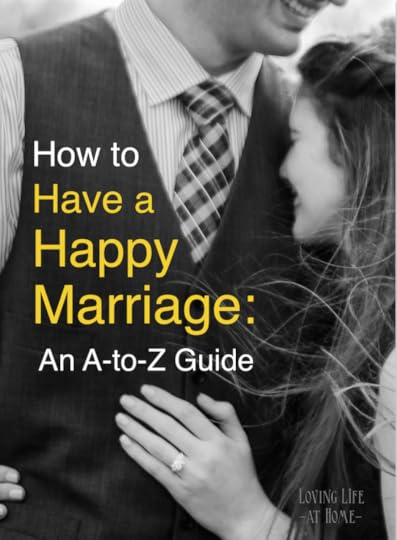








April 2, 2015
It’s All About God’s Grace
In what is becoming an annual tradition, my family helped me create another Easter video over spring break this year. (You can watch last year’s video here.)
This new one is a cover of Meghan Trainor’s catchy song, “All About That Bass” — but with lyrics I don’t mind my little ones singing around the house.
Take a look, and let us know what you think. You’ll find the new words (along with Scriptural supports) printed below.
Best wishes for a blessed Holy Week. It really IS all about God’s grace… and we pray He will lavish that grace upon you!
It’s All About God’s Grace
You’ve got to know it’s all about God’s grace, ’bout God’s grace — know your Bible.
It’s all ’bout God’s grace, ’bout God’s grace — it’s in the Bible.
It’s all ’bout God’s grace, ’bout God’s grace — read your Bible.
It’s all ’bout God’s grace, ’bout God’s grace.
Yeah it’s pretty clear, this world is full of sin (Ecclesiastes 7:20; Romans 3:23)
But Jesus stands a knockin’ for you to let Him in. (Revelations 3:20)
Can’t get to Heaven any other way — (John 14:6; Acts 4:12)
It’s all by grace and all through faith. (Ephesians 2:8-9)
My Jesus came to earth; Your ransom did He pay (Matthew 20:28; Galatians 1:4)
To call you out of darkness into the light of day. (John 3:19; 8:12; 12:46
Now God is working in you — and He won’t stop (Philippians 2:13; Philippians 1:6)
’Till every inch of you is perfect from the bottom to the top. (James 1:4; John 17:23)
Yeah, my Jesus He told me, Don’t worry about your life, (Matthew 6:25)
Just rejoice and be glad even when you encounter strife. (Matthew 5:12; James 1:2)
You know God dresses the lilies and feeds all the sparrows, too. (Luke 12:27-28; Matthew 6:26)
In the same way your Heavenly Father will care for you. (Philippians 4:19; 2 Corinthians 9:8)
Because you know it’s all about God’s grace, ’bout God’s grace — know your Bible.
It’s all ’bout God’s grace, ’bout God’s grace — it’s in the Bible.
It’s all ’bout God’s grace, ’bout God’s grace — read your Bible.
It’s all ‘bout God’s grace, ’bout God’s grace.
But Christ will soon be back. (Acts 1:11; 1 Thessalonians 4:16)
Go ahead, He tells us, be expecting that — (1 Peter 1:13; Luke 12:35-36)
And keep on praying. Spread the welcome mat. (1 Thessalonians 5:17; Hebrews 10:25)
‘Cause I’m here to tell you, (Mark 16:15; Acts 5:32)
Everyone should trust in Jesus, ‘cause His love will never stop. (Romans 10:9; Romans 8:35, 38-39)
Yeah, my Jesus, He died on the cross ‘cause of all our sin, (Romans 5:8; 1 John 4:10)
But He didn’t stay dead — no, He came back to life again. (Matthew 28:6; Acts 2:32)
And NOW He’s in Heaven (Mark 16:18; Colossians 3:1)
Preparing a place for me (John 14:3; Psalm 23:5-6)
and building the mansion you’ll live in eternally. (John 14:2; 2 Corinthians 5:1)
Because you know it’s all about God’s grace, ’bout God’s grace — know your Bible
It’s all ’bout God’s grace, ’bout God’s grace — it’s in the Bible.
It’s all ’bout God’s grace, ’bout God’s grace — read your Bible.
It’s all ‘bout God’s grace, ’bout God’s grace.










